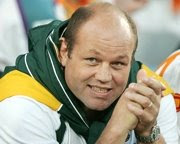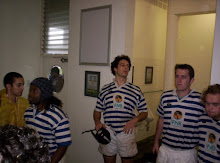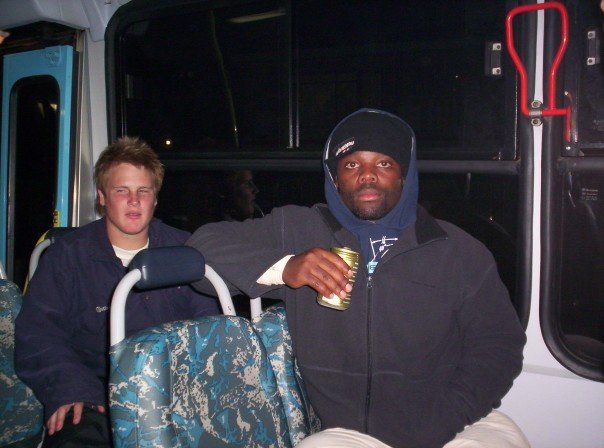
A schoolboy sensation for Bishops, Nick Koster was always destined for greatness. SA Rugby magazine expects him to live up to the hype.
The brief asked for the definitive piece on Nick Koster. Sorry, but that can’t be done. It will have to wait until he is in his mid-20s, when we’ll know for sure where his rugby career is going, what he is about as a player and just how good he really is.
But that a definitive line could even be asked for on someone who is only just one year out of school says everything that needs to be said about just what a big talking point the 19-year-old Stormers player has become. Hype there has been aplenty. How many other school players do you know of who became the subject of a double-page spread in a major newspaper, like Koster was in the Weekend Argus two years ago?
There were some who said it was over-done, but then there would be, for the Cape – until last year’s Currie Cup – seemed to be divided into two sections: There were those who had seen him play and were convinced he was something special, and hence deserving of the hype around his name, and those who hadn’t seen him play and considered it all unnecessary hubris. When the Currie Cup came along, and Koster, to his own surprise, was included on the substitutes bench for a game against the Lions in Jo’burg, the ranks of the doubters were cut significantly. And there was an even bigger dent in that faction later in the competition, when the youngster swarmed all over the Sharks, mightily impressing their coach John Plumtree.
These days the debate seems to go along different lines. It is no longer about whether Koster is good enough. It is about when will be the right time to push him into the big time, about the sort of management that would be wise for such a hot young talent.
In his own way, Rassie Erasmus, the Stormers coach, has acknowledged the relevance of the argument. For when Erasmus started talking about trying Koster on the wing, he was not really saying that he had spotted a great wing in the making, but a player that was extremely young yet way too good to be left out of the team completely.
‘The people who ask me why he’s going to play wing suggest to me that maybe I should send him to sevens instead. But you tell me, what is going to benefit Nick more, exposure to Super 14 rugby, even if it is in a different position to what he is used to, or playing sevens, which really is a completely different game?’ asks Erasmus.
The coach never said it, but only because he didn’t need to – does Koster need the skills fine-tuning which is implied when a player goes to sevens? If you listen to the people who have been pivotal in Koster’s development, and who have helped with the nurturing process, he is one of those rare players who possessed sublime skills while still in the womb.
Nick Mallett, formerly director of coaching at Western Province and also an erstwhile parent supporter of the Bishops 1st XV that Koster was part of, has been aware of Koster’s talents for almost a decade.
‘Koster first came to my attention when he was U10 and he played rugby against my son for Bishops Prep,’ recalls Mallett. ‘He was initially so much bigger and stronger than the other boys his age, he was one of those really early developers. He already stood at six foot when he was 13. So, while his performances were noteworthy, you couldn’t take too much notice of him then as you knew that the other boys would catch up in terms of physique.
‘That was always going to be his big test, playing against the other guys his age on a level playing field where he wasn’t bigger than them. But I am thankful to say he quickly showed that he was just a very gifted and talented sportsman in his own right.
His skills were unbelievable, and one of the things that impressed me was how he bulked up by 20kg when he had a year away from the game, and yet just didn’t lose speed.
‘When someone that skilful has physical ability and has speed, then you know you are onto something special. He played 1st XV when he was still U16, and did not look out of place. He played Western Province Schools in his first year of 1st XV rugby, and in one of the big Craven Week games I saw, he had a really great game even though everyone knew he went into it carrying an injury.’
It was then that Mallett, realising that some of the other provincial unions would also be taking notice and would be keen to contract him, decided to act by offering Koster a senior deal with WP.
‘I didn’t want to see him go to the Bulls or the Sharks, who were quite openly recruiting young players at that time and offering to pay for their education.’
But if this gives the impression that everything always came easy to Koster, it would be wrong. There was a time, when he was U15, that he heard the jarring news that he may never be able to play rugby again.
‘I suffered a torn disc, possibly as a result of my cricket, where I was a fast bowling all-rounder. I missed most of my U15 year, and the doctor gave me a huge scare when he told me I may not play again,’ says Koster. ‘In retrospect, I think he was just laying out the possible scenarios, but for a young sports-mad kid like me, that was a really horrible thing to hear.’
Mallett helped solve the situation by bringing Koster under the care of WP’s team doctor, Ryan Kohler, who is highly regarded in his field.
‘With the help of Ryan, we devised a special training programme to work on Nick’s back problem, which we thought might have been caused by him growing too quickly,’ says Mallett.
‘We worked with him through the year, and with him not playing rugby, he was able to concentrate on his strengthening programme, visiting the Sports Science Institute every week and, as I said earlier, it paid huge dividends for him.
‘Not only was he able to play sport again, but the following year he made WP Schools athletics and excelled on the rugby field. It was then that I realised he could make it onto the big stage and was a really special talent that we needed to look after. I contacted [WP managing director] Rob Wagner and advised him to put Nick on a professional contract.
‘I also got his father involved, suggesting that Nick enrol at Stellenbosch University and remain in the Cape until at least the age of 23 so that he had the best chance of making the most of his development as a rugby player. I reckoned that we could give him the grounding that would set him up for a highly successful career.’
Apart from that year when he battled with his back, Koster – who although humble appears to possess the certainty of path that most really successful, driven people do – was always clear that a professional rugby player was what he wanted to become.
‘I enjoyed cricket when I played it in my early school years, and still love the sport, but rugby was what I was always passionate about. My uncle, Calla Scholtz, played for WP, and he has also worked with me quite a bit. My father runs a stud farm near Bonnievale, about two hours drive from Cape Town, but every weekend when there was a WP game
on, we would travel to Newlands.
‘From a young age I remember being passionate about WP rugby and the Springboks. I remember being up in the clouds with euphoria for days after they won a big game, and crying when they lost. I started playing when I was six years old, and from then on I knew I just loved the game and that it was what I really wanted to do.
‘The other day I was browsing through some of my old schoolbooks which I have kept, and I came across a Grade 2 essay in which we had been asked to say what we wanted to do when we grew up. I wrote all about how I wanted to be a professional rugby player for 10 years. It amazes me now how clear I was.’
And at Bishops he will be remembered for more than just his natural sporting ability, but for the work he put in to ensure it all came together and that he gave himself the best chance of excelling on the rugby field.
André Jacobs, his 1st XV coach for two years, had many young players go through his hands during 12 years at St Andrew’s College in Grahamstown and then a decade at Bishops, and he is convinced that Koster is the special one.
‘Nick was just a superb all-round sportsman, but one of the stand-out memories was how at one stage of his school career he decided that he needed to switch from being a middle-distance athlete to a sprinter,’ says Jacobs.
‘It was astounding how quickly he adjusted and in no time at all he was excelling at the sprints, running away from all his opposition and finding himself rated among the top schoolboy sprinters in the country.’
Koster explains that the switch was motivated entirely by rugby considerations.
‘I used to do hurdles and middle distance when I was young. When I was 14 and 15, my specialities were the 400m and the 800m. When I was 15, I came third in the SA champs. But then I decided that sprinting would help my rugby, and I started to do a lot of work geared towards making me faster.
‘I was really surprised with the results. I went quite quickly from running an 11.9 in the 100m to running an 11.3. And then I cut my time down to 11 seconds dead. It was the result of a lot of leg-power work.’
According to Jacobs, Koster was far more than just a sportsman at school – he was also an intelligent student who did well at academics, and had a rare ability to lead his peers while retaining an air of humility.
‘If you speak to him you will see he is a humble boy, a really nice guy who, despite all his success on the sports field, does not swagger or behave arrogantly. He was the school’s head boy in his matric year, and he was a popular one. But that did not mean he was different to other boys. He still did the naughty things boys do, like fighting for the line, which is a term only people who went to Bishops will understand. Overall though, he is one of the few people I would be unable to comment on if you asked me to point out a weak point or down side to him.’
Former WP League hooker Craig Wilson helped Basil Bey coach the U15 side at Bishops in the year that Koster was in that age-group, and recalls that his strong leadership ability saw him join the coaching staff when he could not play.
‘He only played one or two games for us, but what was very clear was that when he did play for us we went from being a mediocre team to an excellent team. He was one of those guys who made a big difference to the whole team,’ says Wilson. ‘Even when he was a relatively young schoolboy, the other kids seemed to look up to him, and when he couldn’t play, he was there helping us with the coaching. I watched him play Bishops 1st XV many times, but can’t say
any particular game stood out as he was always brilliant, and he always scored a lot of tries.’
On the subject of what position he should play, Jacobs is convinced that although his size came in useful off the back of the scrum at school, he is good enough to make it almost anywhere a coach picks him.
‘He has everything, from outstanding ball skills, strength, speed to great finishing ability. He made things happen around him, he provided spark.’
And for all of that, here is confirmation that Koster, in the words of a Parlotones song, is only human after all. While he was amazed at how quickly he settled into Currie Cup rugby after his unexpected selection last year, he was disappointed that he was unable to carry through his early momentum until the end of the season.
‘It all started so well, I was prepared to try things, and they came off. I really enjoyed myself. But then when the Springbok players returned to the team, I suddenly went through a dry period. I felt different, I was less inclined to give it a full go. I didn’t understand it, I felt like I became inhibited. It is something that I am going to have to work on in the new season.’
That sounds like an admission that, for all his talent, Koster experienced a time when he realised that he was just a 19-year-old kid, and that he still has to graduate to the level that some of his team-mates are on. For all the expectation, he still has it all to do, and his wisdom will hold him in good stead.
‘The expectation does create pressure, but the biggest pressure is the pressure I put on myself, the pressure to achieve what I know I can and to live up to my ability. The media hype does affect you, what people write or say about you has to have some effect as, no matter how hard you try to block it out, you can’t.
‘I must just concentrate on my game, and realise that what people say about me when I play well is often over-done and exaggerated, just as it will sometimes go the other way when I play badly.’
Article written by Gavin Rich [SA Rugby Magazine]





















No comments:
Post a Comment